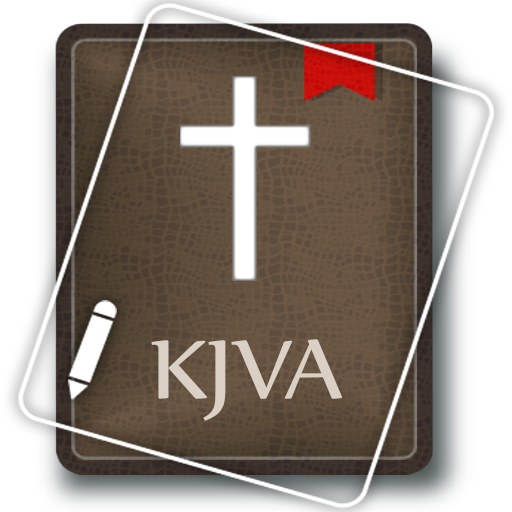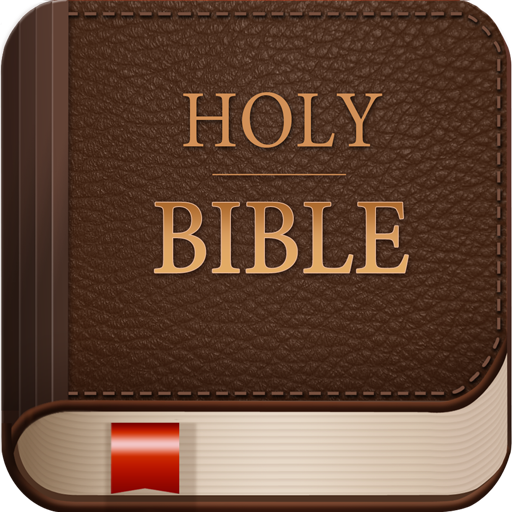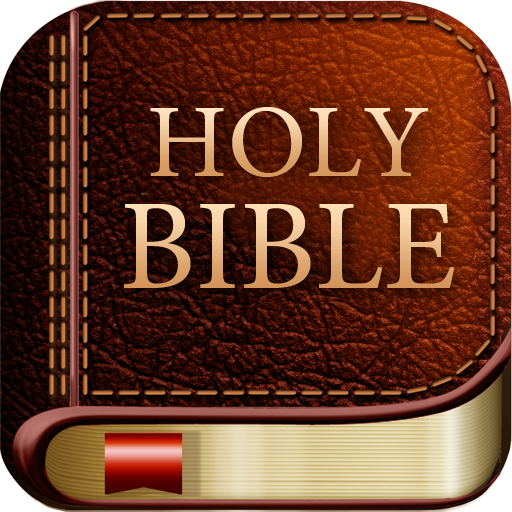

Bible KJV with Apocrypha, Enoch, Jasher, Jubilees
도서/참고자료 | Igor Apps
5억명 이상의 게이머가 신뢰하는 안드로이드 게임 플랫폼 BlueStacks으로 PC에서 플레이하세요.
Play Bible KJV with Apocrypha, Enoch, Jasher, Jubilees on PC
Bible King James Version with Apocrypha
Book of Enoch, Jasher and Jubilees are not in Apocrypha so they are seperated in the Table of Contents and in the Search. Also they are not in Reading Plan and Daily Verses. You can remove these books: Menu->Settings->switch off "Show Enoch/Jasher/Jubilees"
Daily Verse (Daily Psalm, Daily Gospel - you can make your own Daily Verse), Reading Plan (canonical) - read Bible in one Year, 180 Days, 90 Days, Audio Bible (TTS feature) and many others functions.
The King James Version (KJV), commonly known as the Authorized Version (AV) or King James Bible (KJB), is an English translation of the Christian Bible for the Church of England begun in 1604 and completed in 1611. First printed by the King's Printer Robert Barker, this was the third translation into English to be approved by the English Church authorities.
James gave the translators instructions intended to guarantee that the new version would conform to the ecclesiology and reflect the episcopal structure of the Church of England and its belief in an ordained clergy. The translation was done by 47 scholars, all of whom were members of the Church of England. In common with most other translations of the period, the New Testament was translated from Greek, the Old Testament was translated from Hebrew text, while the Apocrypha were translated from the Greek and Latin.
The Biblical apocrypha (from the Greek word ἀπόκρυφος, apókruphos, meaning "hidden") denotes the collection of ancient books found, in some editions of the Bible, in a separate section between the Old and New Testaments or as an appendix after the New Testament. Although the term apocrypha had been in use since the 5th century, it was in Luther's Bible of 1534 that the Apocrypha was first published as a separate intertestamental section. Luther was making a polemical point about the canonicity of these books. As an authority for this division, he cited St. Jerome, who in the early 5th century distinguished the Hebrew and Greek Old Testaments, stating that books not found in the Hebrew were not received as canonical. Although his statement was controversial in his day, Jerome was later titled a Doctor of the Church and his authority was also cited in the Anglican statement in 1571 of the Thirty-Nine Articles.
King James Version
The English-language King James Version (KJV) of 1611 followed the lead of the Luther Bible in using an inter-testamental section labelled "Books called Apocrypha", or just "Apocrypha" at the running page header. The KJV followed the Geneva Bible of 1560 almost exactly (variations are marked below). The section contains the following:
- 1 Esdras (Vulgate 3 Esdras)
- 2 Esdras (Vulgate 4 Esdras)
- Tobit
- Judith ("Judeth" in Geneva)
- Rest of Esther (Vulgate Esther 10:4-16:24)
- Wisdom
- Ecclesiasticus (also known as Sirach)
- Baruch and the Epistle of Jeremy ("Jeremiah" in Geneva) (all part of Vulgate Baruch)
- Song of the Three Children (Vulgate Daniel 3:24-90)
- Story of Susanna (Vulgate Daniel 13)
- The Idol Bel and the Dragon (Vulgate Daniel 14)
- Prayer of Manasses (follows 2 Chronicles in Geneva)
- 1 Maccabees
- 2 Maccabees
Included in this list are those books of the Clementine Vulgate that were not in Luther's canon. These are the books most frequently referred to by the casual appellation "the Apocrypha". These same books are also listed in Article VI of the Thirty-Nine Articles of the Church of England. Despite being placed in the Apocrypha, in the table of lessons at the front of some printings of the King James Bible, these books are included under the Old Testament.
Book of Enoch, Jasher and Jubilees are not in Apocrypha so they are seperated in the Table of Contents and in the Search. Also they are not in Reading Plan and Daily Verses. You can remove these books: Menu->Settings->switch off "Show Enoch/Jasher/Jubilees"
Daily Verse (Daily Psalm, Daily Gospel - you can make your own Daily Verse), Reading Plan (canonical) - read Bible in one Year, 180 Days, 90 Days, Audio Bible (TTS feature) and many others functions.
The King James Version (KJV), commonly known as the Authorized Version (AV) or King James Bible (KJB), is an English translation of the Christian Bible for the Church of England begun in 1604 and completed in 1611. First printed by the King's Printer Robert Barker, this was the third translation into English to be approved by the English Church authorities.
James gave the translators instructions intended to guarantee that the new version would conform to the ecclesiology and reflect the episcopal structure of the Church of England and its belief in an ordained clergy. The translation was done by 47 scholars, all of whom were members of the Church of England. In common with most other translations of the period, the New Testament was translated from Greek, the Old Testament was translated from Hebrew text, while the Apocrypha were translated from the Greek and Latin.
The Biblical apocrypha (from the Greek word ἀπόκρυφος, apókruphos, meaning "hidden") denotes the collection of ancient books found, in some editions of the Bible, in a separate section between the Old and New Testaments or as an appendix after the New Testament. Although the term apocrypha had been in use since the 5th century, it was in Luther's Bible of 1534 that the Apocrypha was first published as a separate intertestamental section. Luther was making a polemical point about the canonicity of these books. As an authority for this division, he cited St. Jerome, who in the early 5th century distinguished the Hebrew and Greek Old Testaments, stating that books not found in the Hebrew were not received as canonical. Although his statement was controversial in his day, Jerome was later titled a Doctor of the Church and his authority was also cited in the Anglican statement in 1571 of the Thirty-Nine Articles.
King James Version
The English-language King James Version (KJV) of 1611 followed the lead of the Luther Bible in using an inter-testamental section labelled "Books called Apocrypha", or just "Apocrypha" at the running page header. The KJV followed the Geneva Bible of 1560 almost exactly (variations are marked below). The section contains the following:
- 1 Esdras (Vulgate 3 Esdras)
- 2 Esdras (Vulgate 4 Esdras)
- Tobit
- Judith ("Judeth" in Geneva)
- Rest of Esther (Vulgate Esther 10:4-16:24)
- Wisdom
- Ecclesiasticus (also known as Sirach)
- Baruch and the Epistle of Jeremy ("Jeremiah" in Geneva) (all part of Vulgate Baruch)
- Song of the Three Children (Vulgate Daniel 3:24-90)
- Story of Susanna (Vulgate Daniel 13)
- The Idol Bel and the Dragon (Vulgate Daniel 14)
- Prayer of Manasses (follows 2 Chronicles in Geneva)
- 1 Maccabees
- 2 Maccabees
Included in this list are those books of the Clementine Vulgate that were not in Luther's canon. These are the books most frequently referred to by the casual appellation "the Apocrypha". These same books are also listed in Article VI of the Thirty-Nine Articles of the Church of England. Despite being placed in the Apocrypha, in the table of lessons at the front of some printings of the King James Bible, these books are included under the Old Testament.
PC에서 Bible KJV with Apocrypha, Enoch, Jasher, Jubilees 플레이해보세요.
-
BlueStacks 다운로드하고 설치
-
Google Play 스토어에 로그인 하기(나중에 진행가능)
-
오른쪽 상단 코너에 Bible KJV with Apocrypha, Enoch, Jasher, Jubilees 검색
-
검색 결과 중 Bible KJV with Apocrypha, Enoch, Jasher, Jubilees 선택하여 설치
-
구글 로그인 진행(만약 2단계를 지나갔을 경우) 후 Bible KJV with Apocrypha, Enoch, Jasher, Jubilees 설치
-
메인 홈화면에서 Bible KJV with Apocrypha, Enoch, Jasher, Jubilees 선택하여 실행



